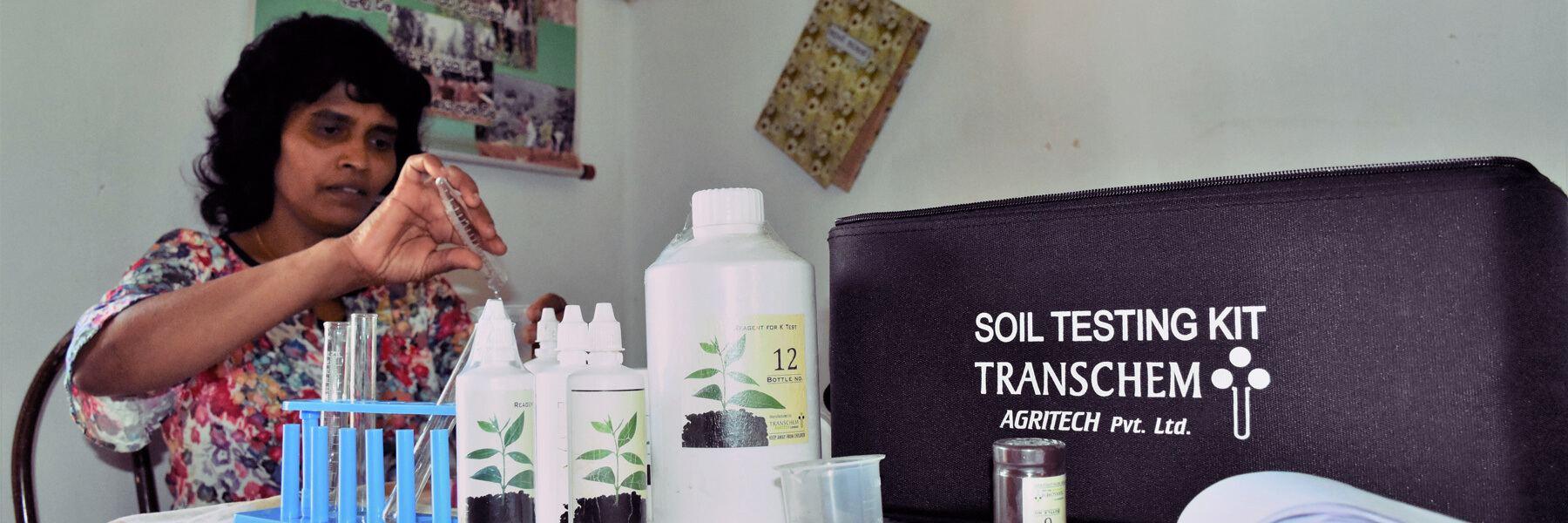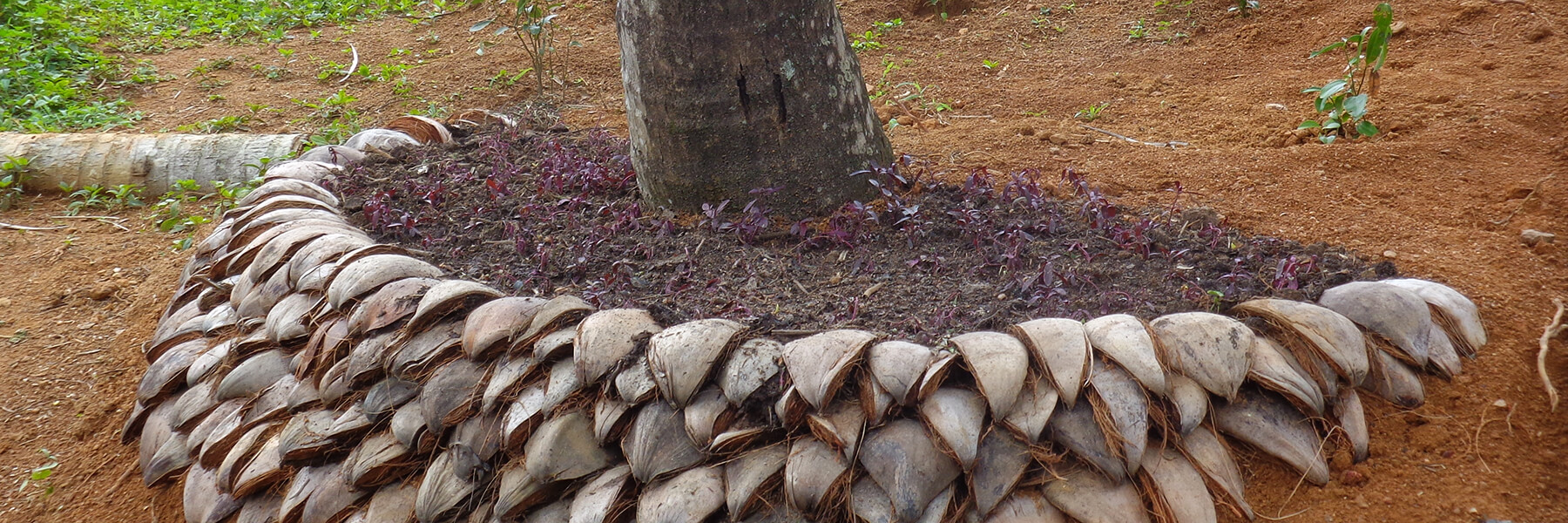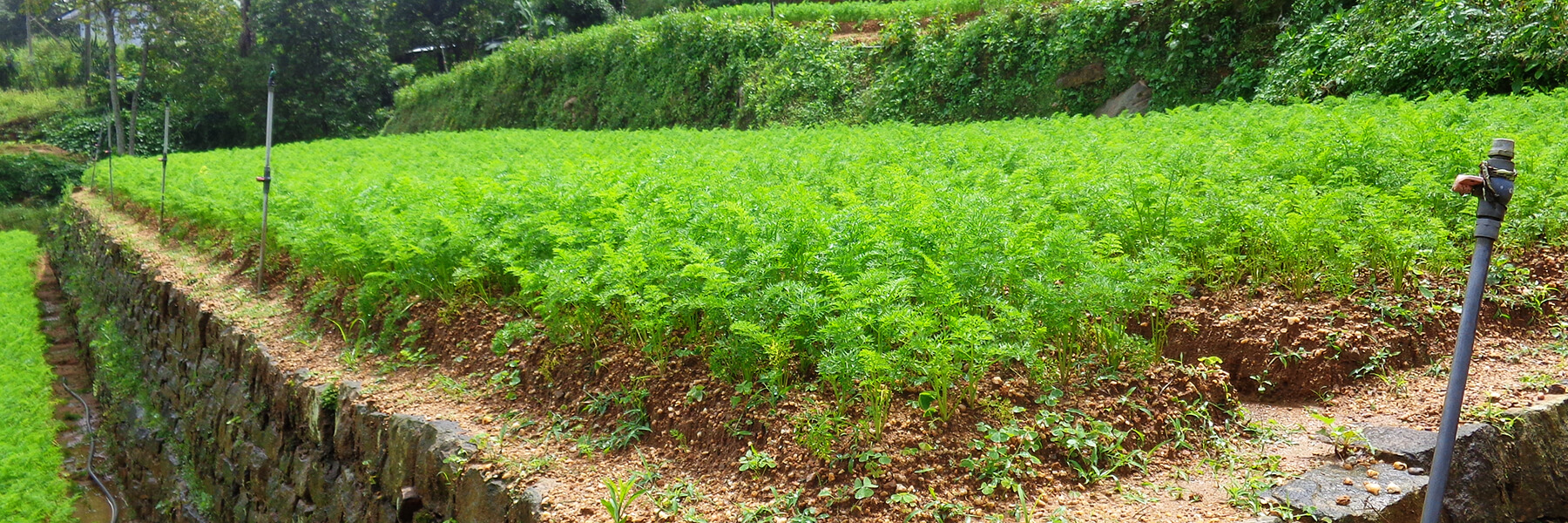Women in the Central Highlands of Sri Lanka practice sustainable land management through vanilla cultivation and earn extra income for their families. The average land size of home gardens in the Central Highlands of Sri Lanka is about 0.25 ac – 0.5 acre. Fruits and spice trees randomly exist in these land plots. The topsoil is always disturbed due to daily human activities. Apart from run-off water from upper lands, rooftop rainwater flows in all directions causing heavy soil erosion in the home gardens.
The home gardens are the least attended land plots in terms of conservation.
Vanilla SLM model is an economically attractive opportunity for women in potential growing areas where ideal environmental conditions are existing. The objectives of the approach are to reduce soil erosion in the home gardens due to daily human activities and to introduce a cash crop with higher economic benefits. In general, it was to promote awareness for sustainable land management (SLM) among the community.
The strategy of the intervention was to motivate landowners towards SLM mainly through introducing income generation crops. Women groups were considered and selected as the most suitable target group for the approach. Income generation through this approach helps them to improve their social and financial status.
The methods of the approach were the following: The women groups were accompanied to well-managed vanilla cultivation (exposure visit) to explain and show them about the financial benefits of vanilla cultivation. Further, the importance of SLM techniques of Vanilla cultivation was discussed and demonstrated. Practical training on individual farm planning, selection and implementation of SLM techniques according to the farm plan and maintenance of the vanilla vines were conducted. The extension officers of the Department of Agriculture supported the whole implementation process in each home garden. Technical support on SLM and the cultivation is provided by the Department of Export Agriculture and coordination and facilitation of trainings by the Agrarian Services Center of the area. The project 'Rehabilitation of Degraded Agricultural Lands in Kandy, Badulla and Nuwara Eliya Districts in the Central Highlands of Sri Lanka (GEF Project ID: 5677)' supported the overall coordination and provision of planting materials. The female farmers have formed their own Vanilla Growers Association and they organize their own training programs on negotiation skills and marketing arrangements. Private vanilla processors and marketers are linked with the women group. The Field Coordinator of the Vanilla processing and exporting company trained the farmers on quality vanilla production and assured the market linkage that keeps farmers interest in SLM and vanilla cultivation.
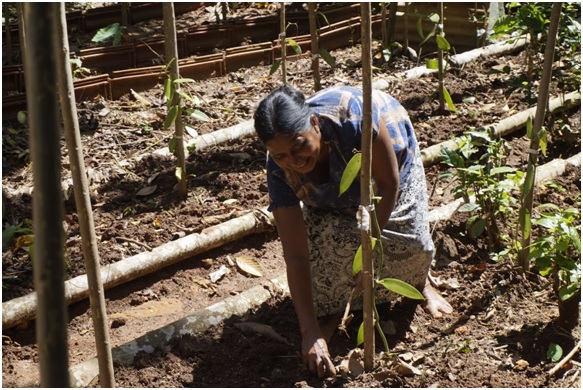
Home backyard soil conservation techniques applied and used to cultivate vanilla. Doluwa, Sri Lanka
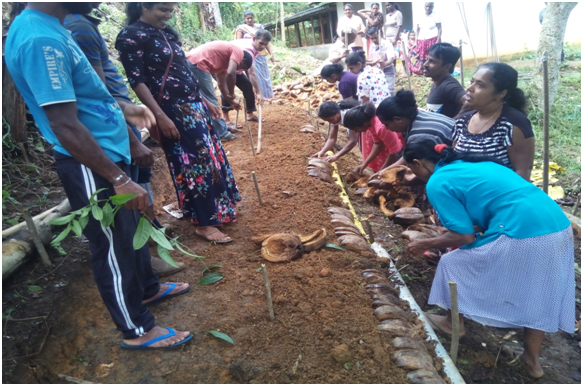
Contour terrace edges protection with coconut husk
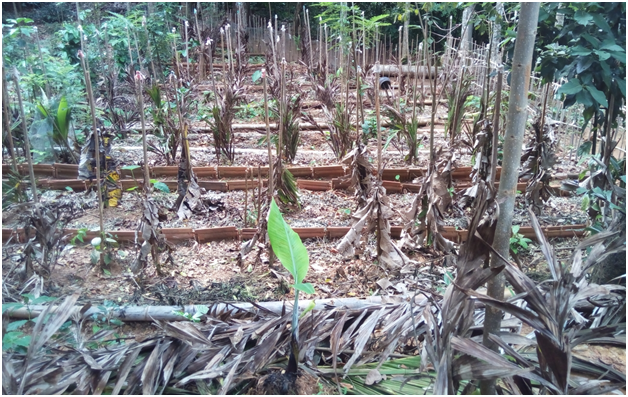
Well established vanilla cultivation at the backyard. Doluwa
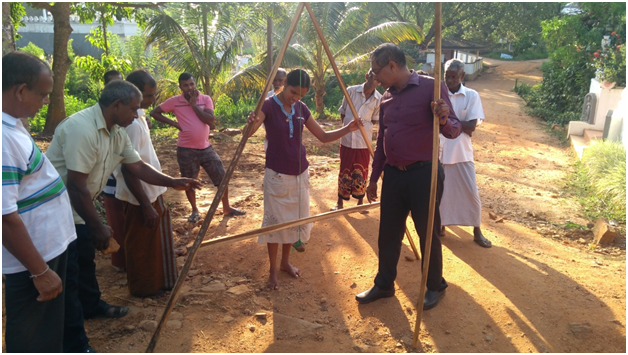
Training on contour line marking using an A – frame. Doluwa
Main aims/ objectives of the Approach
- Introduce SLM in home gardening
- Introduce vanilla cultivation as a sustainable source of income for women, and encourage them to effectively use their free time for income generation
- Add economic and esthetic value for backyards and home gardens.
- Increase environmental awareness among women and inculcate a positive attitude towards environmental protection
Conditions enabling or hindering implementation of the Technology/ Technologies applied under the Approach
social/ cultural/ religious norms and values: Women play an important role in income generation for the family. The income from the vanilla as a highly valued product improves their social status.
availability/ access to financial resources and services: Vanilla is a cash crop and the risk of crop failure is minimal. Therefore, the income is expected to grow and, the accessibility to financial resources and services should increase as well.
institutional setting: The female farmers have formed their own Vanilla Growers Association and they organize their own training programs and marketing arrangements.
collaboration/ coordination of actors: Technical support on SLM and the vanilla cultivation is provided by the Department of Export Agriculture and Agrarian Services Center of the area. Private vanilla processors and marketers are linked with the women group.
legal framework (land tenure, land and water use rights): The approach is practiced around the living house of the families; the surrounding home gardens belong to them. The approach promotes techniques against soil erosion and the use of organic composts. There is no special demand for water since the crop grow well in rain-fed condition.
knowledge about SLM, access to technical support: The technical and extension officers of the government are available for technical support and advice. Private vanilla companies have employed extension officers and promote SLM practices as well. The crop yield mostly depends on the degree of SLM techniques adopted.
markets (to purchase inputs, sell products) and prices: The input requirement is very limited. The planting materials (vanilla cuttings) are easily available. The vine supporting Gliricidia tree is locally available. The SLM techniques applied are simple. The terraced preparation can be done with materials such as coconut husk and tree logs.
The price for natural vanilla is high. The women have been formed into groups and they have developed negotiation skills about the vanilla market.
workload, availability of manpower: The type of the SLM practices are not labor-intensive. Family labor is sufficient to establish 100 - 200 vanilla vine with good SLM techniques such as single platforms and contour platforms. Vanilla can be seen as a labor neutral crop.
Stakeholders involved in the Approach and their roles
- Lead farmer (Vanilla grower) : Training facility and conduct trialing and experience sharing
- Extension officer of Department of Export Agriculture: Provide technical knowledge and training on vanilla growing
- Development Officer of Agrarian Services Center: Coordination and facilitation of training programs
- Extension Officer of Department of Agriculture: Training on SLM, farm plan preparation and demonstration of the best crop management practices
- FAO-GEF Programme Officer: Coordination, technical inputs on SLM and vanilla cultivation
- Private sector: Field Coordinator of the vanilla processing and exporting company
Main motivation of land users to implement SLM
- increased profit(ability), improved cost-benefit-ratio: The approach encourages 100 vanilla plants/vines per family. The average annual yield from one plant/vine is 1 kg after 3 years. The market price was LKR 6,000 (35 USD) per kg of unprocessed green beans. Therefore, the expected annual income of a family is LKR 600,000 (342 USD).
- reduced land degradation: Vanilla grows well in organic matter rich soils. The land users are encouraged to use organic manure. Planting on terraces prevents soil erosion and soil compaction in the surrounding of the homesteads.
prestige, social pressure/ social cohesion: Aesthetic view of a home garden is improved - environmental consciousness: Aesthetic view of home garden is improved, and farmer feels his/er good work.
- enhanced SLM knowledge and skills: Yes. They start to feel the necessity of SLM from the home garden and apply the SLM in his/er other lands.
- aesthetic improvement: Aesthetic view of home garden is improved, and it earns cash for the family
Strengths/ advantages of the Approach
Strengths/ advantages/ opportunities in the land user’s view
In Sri Lanka vanilla is mainly confined as home garden and grown in the back yards. Vanilla is a cash crop that can be grown successfully in Kandy, Nuwara Eliya, Matale, and Kegalle districts.
Vanilla has been identified as an ideal alternative crop for unproductive smallholdings and home gardens. Low labor requirements and higher income are the main advantages of vanilla cultivation and therefore women can use their free time for vanilla cultivation in their home gardens.
Marketing advantage: Vanilla needs only organic fertilizer. A vanilla vine can produce nearly a kilo of vanilla per year and average market price would be around Rs. 6,000 per Kg. (34 USD) which is annually LKR 60,000 (342 USD). This income for the family promotes their interest to adopt SLM techniques.
Strengths/ advantages/ opportunities in the compiler’s or other key resource person’s view
SLM is easy to promote, as the landowner is benefited with high returns. Therefore, an economic model coupled with SLM is an option for easy implementation.
Women play a major role in attitudes change in society. If they consider the SLM practices positively, it is expected to spread easily to other croplands.

